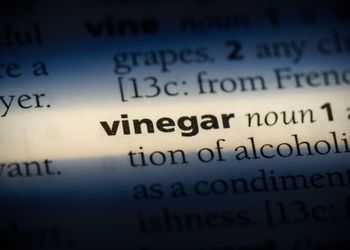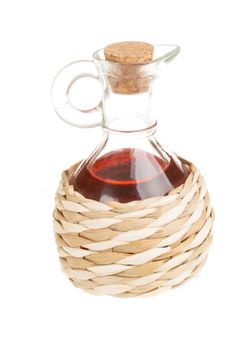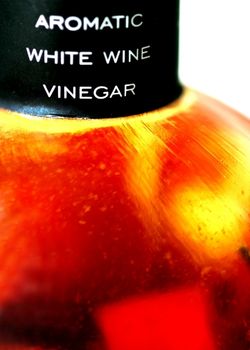Vinegar is a pretty interesting substance when you think about it. Some of us will put vinegar on our food for flavoring or use it for picking while others will use it more often as a natural cleaning agent. It is everywhere, but is that such a good thing for an acidic liquid with a relationship to alcohol? Is vinegar flammable and are we at any risk of using it or keeping bottles of it at home?

Generally vinegar is not flammable. While there are elements in vinegar that are flammable, the high water content of household vinegar keeps it from being flammable. However, chemistry isn’t always that simple. The confusion surrounding the flammability of vinegar comes from the acid content, more specifically the acetic acid.
To better understand the possible dangers of acetic acid and vinegar, we need to look at the following factors.
- What is acetic acid and how dangerous is it?
- How much acetic acid is in vinegar and why isn’t vinegar flammable?
- What will happen if vinegar comes into contact with fire?
- The safety of various culinary forms of vinegar when heated.
Table of Contents
What is acetic acid?
Acetic acid is also known as ethanoic acid and is a potent chemical compound. Concerning vinegar, it gives the product its tangy taste and acidity.
This colorless acid is also an important agent for a lot of products and chemical processes. It is a part of some acetate products, such as the cellulose acetate used in photographic film and the polyvinyl acetate found in wood glue.
How dangerous is acetic acid?
On its own in its pure form, acetic acid can be very dangerous. For a start, the acid is flammable. This is where you get some confusion about the flammability of vinegar.

Acetic acid has a flashpoint of 104 degrees Fahrenheit, which isn’t very high, so can burn quite easily when there is no other ingredient or solution to inhibit the flames.
There is also the problem that acetic acid breaks down at extremely high temperatures of 824 degrees Fahrenheit.
At this point, you end up with a combination of carbon dioxide, methane, ketene, and water. Anyone breathing in these chemicals could be in danger.
Why isn’t vinegar flammable if it contains acetic acid?
Part of the confusion over whether vinegar is flammable comes from the fact that acetic acid is classed as the main active ingredient.
This makes it sound as though there is a lot of it in vinegar and that vinegar should be highly flammable as result.
However, this simply means that it is the acetic acid that does the hard work when it comes to preserving and adding flavor. This can happen with a pretty low percentage of acid.
From there, the vinegar is largely made up of water. It is this high water content that stops flames from getting to the acid and stops the liquid from catching fire.
What happens if vinegar comes into contact with fire?
If vinegar were to come into contact with a flame then there is nothing to worry about. It is very difficult for vinegar to ever become hot enough that it will break down into its main elements and the acetic acid will separate from the water.
Even if the water were to evaporate, there wouldn’t be much acid left. It may be possible in very controlled environments with extreme heat and the right sort of vinegar, but it is unlikely anything will actually burn.
Is household table vinegar or rice wine vinegar safe?
Yes. You don’t need to worry about the bottles of vinegar in your cupboard because they aren’t a fire risk.
Standard forms of table, rice wine, or cider vinegar aren’t dangerous in small amounts. You can inhale the fumes when adding the liquid to dishes and not worry about negative effects.
You can have a large jar of pickled onions or gherkins in the cupboard and not worry.
So, don’t let the presence of acetic acid in vinegar stop you from trying out different recipes or getting into the hobby of making preserves.
Different types of vinegar have different acetic acid contents.
At no point does vinegar contain such a high acetic acid content that it becomes dangerous. You only need a little bit to get a strong taste and to create the pickles and preserves you want.

Still, there are differences between different types of products and it doesn’t hurt to be aware of how commonly used products compare. So, let’s work our way up the scale.
- At the lowest end of the scale are your basic malt or table vinegars. These are the once sprinkled over fries and other foods for that nice vinegary taste. These are typically 4% acetic acid.
- Next, you have apple cider vinegar. This is a great product for food and beauty treatments. You may have a relatively large bottle of this to add to baths or for other detoxification needs. Again, there is no flammability risk because there is only 5-6% acetic acid.
- Rice wine vinegar is another very popular product. There is a different taste and it works brilliantly in sources for Asian cuisine. Again, you may have a big bottle if you love making sweet and sour meals at home. But, at 6% acetic acid, it isn’t going to do any harm.
- Finally, there are other forms of cooking vinegar that you can add to your meals and sources. Some of these will have a higher content, as the acid may cook off in the process. But, they don’t tend to go above 8% acetic acid so still aren’t anything to worry about.
Can you flambé with balsamic vinegar?
This is something that you may have seen reference to online, where home cooks try and replace the alcohol on flambéed food with balsamic vinegar.
The idea is that you get a similar taste and effect to your desserts without having to add alcohol. The idea of an alcohol-free flambé is great, but this isn’t the way to get there.
The water content in the balsamic vinegar means that you won’t be able to set it alight as you would the pure alcohol in something like brandy or rum.
Will vinegar catch fire in an oven or microwave?
A concern that you may have here is that vinegar will catch fire or pose a safety risk when used in an oven or microwave.
Thankfully, regardless of how it is heated, vinegar does not have enough acetic acid to be flammable under these high temperatures.
As seen above, there are no fire risks when cooking with cooking vinegars and rice wine vinegars. You can add them to sauces, heat up the pan, and nothing will catch fire.
Some people refrain from using vinegar to clean their oven, just in case. But, there are those that use diluted vinegar to descale kettles with no problem at all.
On a related note, some boil vinegar to disinfect their kitchens. The idea here is that the cleaning agents in the pure vinegar will evaporate into the air and provide a cleaner and healthier environment.
It is also used as a form of air freshener, although you are surely just masking the smell of something more unpleasant with the unmistakable odor of vinegar.
Are vinegar cleaning products flammable?
This is where things can get a little more complicated. Vinegar on its own isn’t dangerous in small quantities and there is no fire risk if it comes into contact with a flame.
If you were to use general pure white vinegar when cleaning then you should have a similar experience because of the composition of the liquid and high water content.
From there you can add baking soda to the mixture for that foaming effect and still not have anything to worry about regarding the flammability.
In fact, baking soda is a good ingredient to have in the kitchen as an emergency fire extinguisher.
The problems can arise when there are other elements to your cleaning solution.
For example, you may have a store-bought surface or bathroom cleaner with added vinegar alongside other chemicals.
These chemicals could be more dangerous when sprayed or if they come in contact with flames. It is important to always store your cleaning products safely and to keep rooms well ventilated.
To summarize, there is nothing to be concerned about when you have any kind of vinegar at home. The composition and high water content of the liquid mean that any acetic acid present isn’t going to burn.
You can work with all kinds of pure culinary and cleaning vinegar products, heat them up, and not have any concerns about fire risks.
But, always be careful when there are other ingredients or chemicals in the mix.